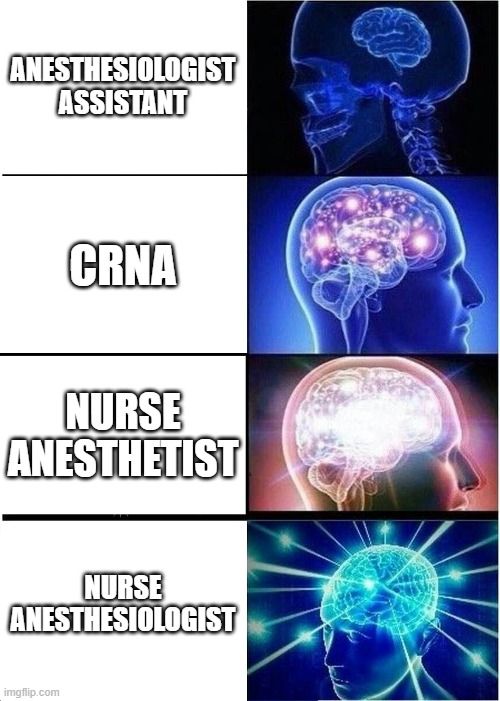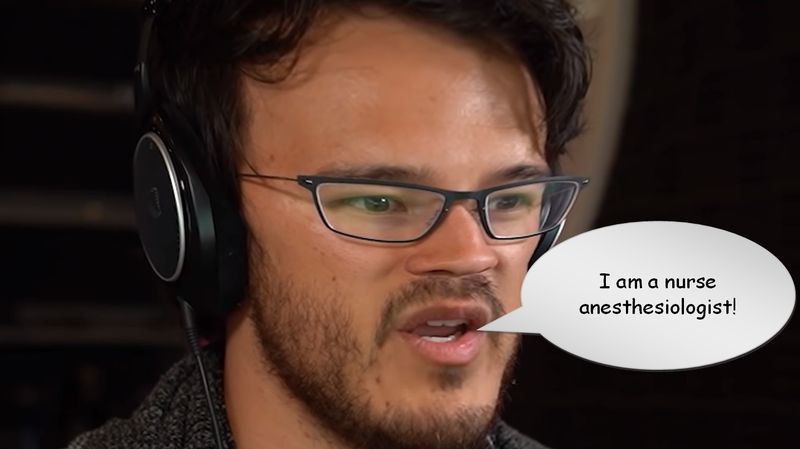CRNA John McDonough wants "clear and unambiguous" titles, but calls himself a "nurse anesthesiologist"
💬 comments
You're either a nurse, or you're an anesthesiologist. Not both.

Recently, midlevel CRNA John McDonough of Florida penned a guest editorial for FloridaPolitics.com (linked above) entitled "Ambiguous titles for health providers are not good for patients: Don’t CRNAs deserve the same freedom to clarify the role of their profession?" Seems reasonable enough, right? Read past the first paragraph, though, and it quickly becomes apparent that McDonough's screed is nothing more than a grand logical fallacy and a comically futile exercise in circular reasoning.

McDonough, being the midlevel CRNA he is, unsurprisingly expresses his opposition to Florida House Bill 721 (and its sister Florida Senate Bill 1142), which is currently being read by the Florida House of Representatives as of this writing. HB 721 restricts the term "anesthesiologist" to physicians or dentists only, and similarly restricts the term "dermatologist" to physicians only. In addition, it requires all health care practitioners to provide written (e.g. through a name tag) or oral notice to patients of their license or specialty designation, and lays out administrative sanctions such as fines and license suspension for violations of these statutes. McDonough essentially claims that due to the existence of anesthesiologist assistants, HB 721 would "muddy the waters for patients by allowing one group of medical assistants to claim the same title as advanced, highly skilled nursing professionals", although it's not at all clear how this would be the case.
What's hilariously ironic about McDonough's opposition to this bill is the fact that CRNA McDonough bills himself as a "nurse anesthesiologist". It appears that he hated the title of his own profession so much that he felt the need to appropriate the title of a physician. McDonough's apparent insecurity over his own job title was so great that he petitioned the Florida Board of Nursing in 2019 for the right to call himself a "nurse anesthesiologist". The nursing board, unfortunately, allowed this, but just for him. Special snowflake much? For the record, the American Society of Anesthesiologists explicitly defines an anesthesiologist as "a physician licensed to practice medicine who has successfully completed a training program in anesthesiology accredited by the ACGME, the American Osteopathic Association or equivalent organizations." The New Hampshire Supreme Court recently upheld a ruling to this effect. Quite frankly, there is no such thing as a "nurse anesthesiologist", in the same way that there is no such thing as a flight attendant pilot. You're either a nurse, or you're an anesthesiologist. Unless you went to both nursing school and medical school and completed a residency in anesthesiology, you can't be both. So much for being clear and unambiguous! We wonder, why didn't he petition the Florida Board of Medicine or the ASA as well? He even has the gall to ask "Don’t CRNAs deserve the same freedom to clarify the role of their profession?" Yeah, dude, they do. Like anyone in every other healthcare profession, they have the freedom to be honest and transparent and tell patients exactly what they are - Certified Registered Nurse Anesthetists and midlevel providers.
McDonough then turns his attention to attacking the educational standards of anesthesiologist assistants. Oh boy, it's a midlevel-versus-midlevel battle! He makes some highly questionable, if not downright false claims here. McDonough claims that CRNAs spend "at least seven to eight years to acquire the education and clinical training to become experts in the administration of anesthesia to patients", while "one needs only 24 months of training to become an anesthesiologist assistant." Are we forgetting about undergraduate degree prerequisites now? Entry into a typical CRNA program requires a bachelor's degree in nursing (not hard), one year of critical care nursing experience; the CRNA program itself is 2-3 years in length. For reference, admissions criteria into anesthesiologist assistant (AA) programs, which are typically 24-28 months long, include a bachelor's degree with pre-medical courses (harder than nursing courses), completion of either the MCAT or GRE, and are overall more rigorous than those of CRNA programs. Anecdotally speaking, anesthesiologists often prefer working with AAs over CRNAs, because the educational model of the former was designed by anesthesiologists to fully integrate with the concept of the physician-led Anesthesia Care Team. Nevertheless, neither CRNAs or AAs have education, training, or experience comparable to that of of actual anesthesiologists, which typically includes a bachelor's degree, four years of medical school, one year of internship, three years of residency in anesthesiology, and possibly another year or more in fellowship. Hopefully, CRNA McDonough's ability to accurately dose anesthetic medications exceeds his ability to accurate compare the educational timelines of different professions, because he isn't even comparing apples to apples here!

In any case, it's hard to see how HB 721 would "muddy the waters" as McDonough claims. Anesthesiologist assistants assist anesthesiologists, much in the same way that physician assistants assist physicians. They're all midlevel providers who are part of physician-led teams. McDonough might think of himself as a "highly skilled nursing professional", but in the eyes of the American Society of Anesthesiologists, as a CRNA he is just as much of a "medical assistant" as an AA is! We're not sure which group CRNA McDonough despises more - anesthesiologists, or anesthesiologist assistants, because it seems that his solution is to misappropriate the title of the former in order to differentiate himself from the latter. Indeed, he was quoted in 2019 as saying, "So I think anesthesiologist is a perfectly acceptable term, especially since the term anesthetist has been hijacked from my profession." That's definitely a Big Brain move right there!